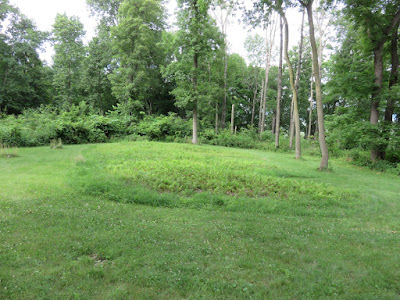 |
| Bear shaped mound - bear shown in profile - head in the foreground, two legs in the back |
Pre-historic Native Americans known as the Mound Builders built earthen mounds along the
Mississippi River valley. We saw some in
Mississippi several years ago beside the Natchez Trace. There are some more in Illinois across from
St. Louis. Some of the mounds are huge,
and some of them are small.
Most of the Iowa section of the Mississippi Valley is low land
with gently rolling hills. However,
around the tiny towns of McGregor and Marquette, Iowa there are 800 foot
limestone escarpments looming over the river.
Along the top of these ridges Woodland Indians built mounds shaped like
animals between 850 and 1,400 years ago.
In addition to mounds shaped like birds, turtles, lizards, bison and
bears the builders left conical and linear mounds. There were 10,000 of these mounds counted in
Iowa and Wisconsin in the early 1900s.
The land was logged or turned into farmland. 100 years later, there were fewer than 1,000 left.
The Effigy Mounds National Monument
protects about 200 of these.
From the parking lot, you hike a steep path with switchbacks
to the top of the escarpment. There are
several conical mounds at the bottom of the path with more conical mounds and a few
linear mounds at the top. As you walk
further you come to the Small Bear Mound.
The bear is shown in profile, lying on its side. A bit further down the trail is the Great Bear
Mound. A typical effigy mound is 2 to 4
feet high, 40 feet wide and 80 feet long.
Great Bear is 70 feet wide and 137 feet long.
The mounds look like they were made to be viewed from
above. As you walk around them you can
see the legs, body and head of the bear.
The NPS has mowed around them, so you can see the shapes more
clearly. The photos didn’t come out that
well.
The mounds are in a quiet and lovely location. A quick hike down short side trails takes you
to beautiful overlooks of the Mississippi River. The location is sacred to the Native American
descendants of the mound builders.
We stayed at Pikes Peak State Park, 7 miles down the road
from the Effigy Mounds National Monument.
The park is on another escarpment.
They call this area of Iowa the Driftless Area because it escaped
glaciation during the last glacier, preserving the tall limestone bluffs along
the river. Zebulon Pike explored this
high cliff in 1805 as a possible army fort, a year before he did the same for
the peak that bears his name in Colorado.
The escarpment overlooks where the Wisconsin River joins the
Mississippi. The view is spectacular.
 |
| Looking North up the Mississippi from Pikes Peak |
 |
| The Wisconsin River meets the Mississippi River |





Yes and yes again. So very beautiful and soothing. And people think Iowa is flat. Isn't the sky wonderful. Bet the moon was a honey.
ReplyDeleteTakes your breath away.
Notice how clean and neat the town is.